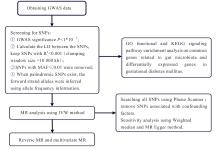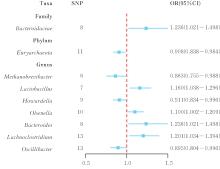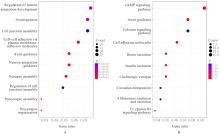| 1 |
WANG H, LI N, CHIVESE T, et al. IDF diabetes atlas: estimation of global and regional gestational diabetes mellitus prevalence for 2021 by international association of diabetes in pregnancy study group’s criteria[J]. Diabetes Res Clin Pract, 2022, 183: 109050.
|
| 2 |
PLOWS J F, STANLEY J L, BAKER P N, et al. The pathophysiology of gestational diabetes mellitus[J]. Internat J Moleculr Sci, 2018, 19(11): 3342.
|
| 3 |
PETERS R K, KJOS S L, XIANG A, et al. Long-term diabetogenic effect of single pregnancy in women with previous gestational diabetes mellitus[J]. Lancet (London, England), 1996, 347(8996): 227-230.
|
| 4 |
DABELEA D, HANSON R L, LINDSAY R S, et al. Intrauterine exposure to diabetes conveys risks for type 2 diabetes and obesity: a study of discordant sibships[J]. Diabetes, 2000, 49(12): 2208-2211.
|
| 5 |
BIELKA W, PRZEZAK A, PAWLIK A. The role of the gut microbiota in the pathogenesis of diabetes[J]. Int J Mol Sci, 2022, 23(1): 480.
|
| 6 |
IONESCU R F, ENACHE R M, CRETOIU S M, et al. Gut microbiome changes in gestational diabetes[J]. Int J Mol Sci, 2022, 23(21): 12839.
|
| 7 |
MEDICI DUALIB P, OGASSAVARA J, MATTAR R, et al. Gut microbiota and gestational diabetes mellitus: a systematic review[J]. Diabetes Res Clin Pract, 2021, 180: 109078.
|
| 8 |
KURILSHIKOV A, MEDINA-GOMEZ C, BACIGALUPE R, et al. Large-scale association analyses identify host factors influencing human gut microbiome composition[J]. Nat Genet, 2021, 53(2): 156-165.
|
| 9 |
KURKI M I, KARJALAINEN J, PALTA P, et al. FinnGen provides genetic insights from a well-phenotyped isolated population[J]. Nature, 2023, 613(7944): 508-518.
|
| 10 |
ELSWORTH B, LYON M, ALEXANDER T, et al. The MRC IEU OpenGWAS data infrastructure[J]. bioRxiv, 2020.08.01.244293v1.
|
| 11 |
LU S, WANG J H, KAKONGOMA N, et al. DNA methylation and expression profiles of placenta and umbilical cord blood reveal the characteristics of gestational diabetes mellitus patients and offspring[J]. Clin Epigenetics, 2022, 14(1): 69.
|
| 12 |
Birney E, Soranzo N. The end of the start for population sequencing[J]. Nature, 2015, 526: 52-53.
|
| 13 |
BOWDEN J, HOLMES M V. Meta-analysis and Mendelian randomization: a review[J]. Res Synth Methods, 2019, 10(4): 486-496.
|
| 14 |
FARHAT S, HEMMATABADI M, EJTAHED H S, et al. Microbiome alterations in women with gestational diabetes mellitus and their offspring: a systematic review[J]. Front Endocrinol, 2022, 13: 1060488.
|
| 15 |
CAI Y Y, HUANG F Q, LAO X Z, et al. Integrated metagenomics identifies a crucial role for trimethylamine-producing Lachnoclostridium in promoting atherosclerosis[J]. NPJ Biofilms Microbiomes, 2022, 8(1): 11.
|
| 16 |
AL-OBAIDE M A I, SINGH R, DATTA P, et al. Gut microbiota-dependent trimethylamine-N-oxide and serum biomarkers in patients with T2DM and advanced CKD[J]. J Clin Med, 2017, 6(9): 86.
|
| 17 |
ZHU W F, GREGORY J C, ORG E, et al. Gut microbial metabolite TMAO enhances platelet hyperreactivity and thrombosis risk[J]. Cell, 2016, 165(1): 111-124.
|
| 18 |
LI P Y, ZHONG C R, LI S Z, et al. Plasma concentration of trimethylamine-N-oxide and risk of gestational diabetes mellitus[J]. Am J Clin Nutr, 2018, 108(3): 603-610.
|
| 19 |
RAMEZANI A, NOLIN T D, BARROWS I R, et al. Gut colonization with methanogenic Archaea lowers plasma trimethylamine N-oxide concentrations in apolipoprotein E-/- mice[J]. Sci Rep, 2018, 8(1): 14752.
|
| 20 |
ZHAN Q T, QI X C, WENG R P, et al. Alterations of the human gut microbiota in intrahepatic cholestasis of pregnancy[J]. Front Cell Infect Microbiol, 2021, 11: 635680.
|
| 21 |
WADHWANI N S, NARANG A S, MEHENDALE S S, et al. Reduced maternal erythrocyte long chain polyunsaturated fatty acids exist in early pregnancy in preeclampsia[J]. Lipids, 2016, 51(1): 85-94.
|
| 22 |
DEVARSHI P P, GRANT R W, IKONTE C J, et al. Maternal omega-3 nutrition, placental transfer and fetal brain development in gestational diabetes and preeclampsia[J]. Nutrients, 2019, 11(5): 1107.
|
| 23 |
GAO Y, LIU L, LI C, et al. Study on the antipyretic and anti-inflammatory mechanism of Shuanghuanglian oral liquid based on gut microbiota-host metabolism[J]. Front Pharmacol, 2022, 13: 843877.
|
| 24 |
MOCANU V, RAJARUBAN S, DANG J, et al. Repeated fecal microbial transplantations and antibiotic pre-treatment are linked to improved clinical response and remission in inflammatory bowel disease: a systematic review and pooled proportion meta-analysis[J]. J Clin Med, 2021, 10(5): 959.
|
| 25 |
CANI P D, AMAR J, IGLESIAS M A, et al. Metabolic endotoxemia initiates obesity and insulin resistance[J]. Diabetes, 2007, 56(7): 1761-1772.
|
| 26 |
CIESIELSKA A, MATYJEK M, KWIATKOWSKA K. TLR4 and CD14 trafficking and its influence on LPS-induced pro-inflammatory signaling[J]. Cell Mol Life Sci, 2021, 78(4): 1233-1261.
|
| 27 |
SHI H, KOKOEVA M V, INOUYE K, et al. TLR4 links innate immunity and fatty acid-induced insulin resistance[J]. J Clin Invest, 2006, 116(11): 3015-3025.
|
| 28 |
MATENCHUK B A, MANDHANE P J, KOZYRSKYJ A L. Sleep, circadian rhythm, and gut microbiota[J]. Sleep Med Rev, 2020, 53: 101340.
|
| 29 |
REUTRAKUL S, VAN CAUTER E. Interactions between sleep, circadian function, and glucose metabolism: implications for risk and severity of diabetes[J]. Ann N Y Acad Sci, 2014, 1311: 151-173.
|
| 30 |
ZHAI L X, WU J Y, LAM Y Y, et al. Gut-microbial metabolites, probiotics and their roles in type 2 diabetes[J]. Int J Mol Sci, 2021, 22(23): 12846.
|
| 31 |
刘树慧, 金 健, 张锦玉. DPP-4抑制剂参与调控糖尿病肾病机制的研究进展[J]. 延边大学医学学报, 2024, 47(1): 54-57..
|
 ),Suyan TIAN1
),Suyan TIAN1






